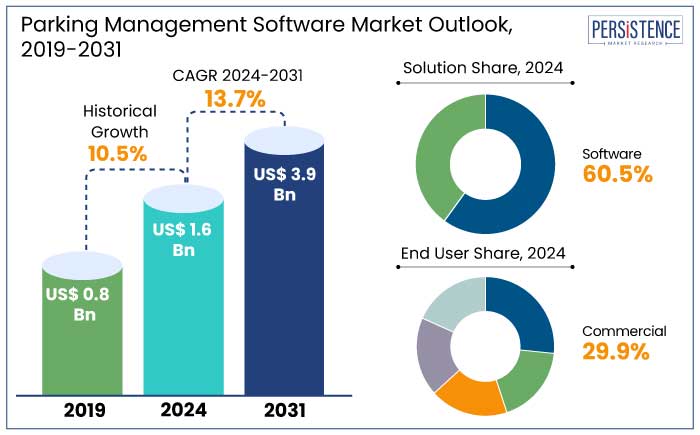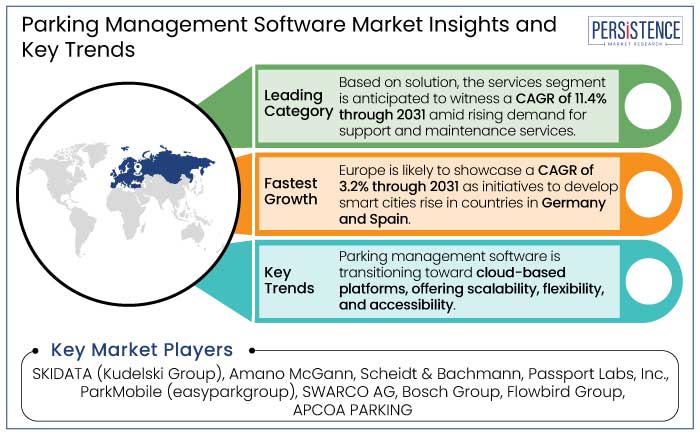Parking Management Software Market
Industry: IT and Telecommunication
Published Date: December-2024
Format: PPT*, PDF, EXCEL
Delivery Timelines: Contact Sales
Number of Pages: 191
Report ID: PMRREP35014
The parking management software market is estimated to increase from US$ 1.6 Bn in 2024 to US$ 3.9 Bn by 2031. The market is projected to record a CAGR of 13.7% during the forecast period from 2024 to 2031.
Rising car ownership and the ensuing parking problems in cities are directly related to the surging need for parking management software worldwide. Vehicle ownership has increased globally due to rising disposable income and rapid urbanization. These factors have made traffic congestion and parking shortages worse.
Parking management software is a key tool for both businesses and urban planners. This is due to its ability to provide features like contactless payment systems, real-time availability updates, and analytics to maximize parking spaces.
The RTA Smart Parking Project in Dubai is a recent example. It has shortened parking times by 30% by using AI to direct cars to open spaces. Similarly, parking management software is being adopted across Europe to address urban traffic issues due to Germany's Smart Mobility initiative.

Key Highlights of the Market
|
Market Attributes |
Key Insights |
|
Parking Management Software Market Size (2024E) |
US$ 1.6 Bn |
|
Projected Market Value (2031F) |
US$ 3.9 Bn |
|
Global Market Growth Rate (CAGR 2024 to 2031) |
13.7% |
|
Historical Market Growth Rate (CAGR 2019 to 2023) |
10.5% |
Europe parking management software market is set to continue its dominance with a share of 32.9% in 2024. One key factor driving the market in Europe is the increasing adoption of smart city initiatives. For instance,
Governments and municipalities across the region are investing in smart city technologies to improve urban infrastructure, reduce traffic congestion, and enhance sustainability. Parking management software solutions enable efficient use of parking spaces through real-time monitoring, automated payment systems, and analytics, aligning with the goals of these initiatives. Owing to the aforementioned factors, Europe is estimated to witness a CAGR of 3.2% through the forecast period.
It is anticipated that the services segment by solution will experience notably consistent growth throughout the projected timeframe at a CAGR of 11.4%. Parking management solutions are becoming more widely used, which is set to increase demand for support and maintenance services.
The parking management services industry is set to be driven by increasing urbanization, rising vehicle ownership, and growing need for efficient parking solutions to address urban traffic congestion. Moreover, government regulations promoting the adoption of sustainable and energy-efficient parking systems are anticipated to push demand. In addition, rising demand for contactless payment options post-pandemic propels growth. For example,
By end user, the commercial segment continues to be the leading category in the parking management system industry. It is projected to account for a significant share of 29.9% in 2024. Factors such as rising traffic of commercial motor vehicles, regulated time limits for driving, and tight schedules for delivery are leading to increased demand for commercial vehicle parking and parking management software. For instance,
Parking management software is a digital tool designed to simplify and optimize the operations involved in managing parking lots or garages. This powerful technology brings efficiency to the way one handles space allocation, payment processing, parking enforcement, and reporting in various types of parking facilities.
Parking management software comes packed with several benefits that can revolutionize the way to control the parking facilities. From enhancing efficiency to elevating user experience, these benefits can transform an often-stressful process into a smooth and streamlined one.
By providing real-time data access and automated reporting, the car parking management system allows for quick decision-making and better space utilization. This cuts down on wasted time and resources and leads to more efficient operation. Features like reservation systems and in-app payment processing make the parking experience highly convenient for drivers. This, in turn, can lead to rising customer satisfaction and loyalty.
There is a growing trend toward implementing smart parking solutions that leverage technology such as IoT sensors, real-time data analytics, and mobile apps. Smart parking software enables features like real-time parking availability, reservation systems, and digital payments, enhancing user experience and operational efficiency.
There is a growing popularity of mobile parking applications that allow drivers to find parking spots, pay for them, and manage parking sessions remotely. These help in integrating with smart parking systems for real-time information.

The COVID-19 pandemic profoundly impacted the parking management software market, causing disruptions in its historical performance. In 2020, the market experienced a significant downturn. Lockdown measures and travel restrictions led to reduced demand for parking services across various sectors such as commercial, retail, and hospitality.
The market witnessed a resurgence in growth from 2020 to 2023, driven by the increasing adoption of digital parking solutions to enhance safety, efficiency, and customer experience. The market recorded a CAGR of 10.5% from 2019 to 2023, indicating steady growth during the historical period.
The parking software solutions industry is projected to rise at a CAGR of 13.7% from 2024 to 2031. This growth trajectory is fueled by factors such as rapid urbanization, smart city initiatives, and technological developments.
The factors are set to drive demand for innovative parking solutions capable of optimizing space utilization, reducing congestion, and improving urban mobility. Additionally, growing focus on sustainability and environmental conservation is anticipated to propel market expansion. Automated parking systems are estimated to contribute to reducing carbon emissions and promoting eco-friendly transportation alternatives.
Surging Use of Smartphone Apps to Reserve Parking Spots Augments Demand
Mobile apps enable drivers to reserve parking spaces in advance, offering added convenience and peace of mind, especially in high-demand areas or during peak hours. By allowing drivers to pre-book parking spots through the app, operators can better manage parking demand, optimize space utilization, and improve operational efficiency. This feature is particularly valuable for event parking, airport parking, and other scenarios where demand for parking can exceed supply.
Increasing usage of smartphones and other mobile devices has given drivers access to mobile applications that makes parking options easier. These parking apps make use of features and services that smartphones have to offer. These include real-time data connectivity, GPS navigation, and mobile payment capabilities, which help to make parking easier for drivers.
Rising Automobile Ownership to Boost Demand Worldwide
The parking management software market is being driven by the increasing need for parking spaces, which is being driven by the rising global ownership of automobiles. Demand for effective parking solutions has surged as automobile ownership rates, particularly in the U.S., Europe, Vietnam, China, and India, reach previously unheard-of heights. For instance,
Exponential growth in vehicle ownership, mainly in densely populated urban areas, has led to a pressing need for effective parking management solutions. Traditional approaches to parking management are no longer sufficient to address the challenges posed by the proliferation of vehicles. Consequently, there is a rising emphasis on adopting innovative technologies and strategies to optimize parking utilization, lower congestion, and enhance urban mobility.
System Integration Complexities to Hinder Growth
The widespread adoption and smooth operation of parking management software faces a significant challenge, i.e. system integration complexities. Consider a complex machine with several parts, each needing to work together flawlessly. Parking systems are similar, requiring seamless integration of a diverse range of technologies.
One key hurdle lies in the sheer variety of hardware components. These include sensors detecting occupancy, real-time messaging systems for data flow, traffic control devices like gates, and communication networks. The challenge arises when these components come from different vendors, each with their own specifications. This incompatibility makes them difficult to function as a unified system, hindering data exchange and creating isolated data pockets.
Stringent Government Regulations to Hamper Demand
Presence of strict government regulations on parking spaces poses significant challenges and limitations for the parking management software market. These rules, enforced through laws like the Maharashtra Municipal Corporation Act, 1949 and the Motor Vehicle Act, 1988, impact various aspects of parking provision, fees, and enforcement.
The regulatory landscape surrounding parking spaces reflects broader urban planning objectives, transportation policies, and environmental considerations. While regulations serve to maintain parking activities and promote public interests, they can also pose challenges for the implementation and operation of parking management solutions.
Companies Launch Smart Parking Solutions to Make Parking Safe with Technology
In the dynamic landscape of parking management software, the fusion of robotics and automation has revolutionized the way drivers experience parking. Automated car parking systems are redefining convenience by autonomously maneuvering vehicles into designated spots. These are eliminating the hassles of manual navigation in cramped spaces, particularly beneficial in densely populated urban settings where parking is at a premium.
The integration of technology offers a myriad of opportunities to enhance user experience within the automated car parking domain. Through sophisticated data analytics and AI algorithms, parking operators can gain deep insights into individual parking preferences and behavior patterns.
It empowers them to tailor parking experiences. They are set to hence offer personalized services such as preferred parking spots, guidance, and reservation options based on historical usage data or user preferences. Such tailored experiences not only enhance customer satisfaction but also foster loyalty toward the parking facility.
Emergence of Parking Kiosks to Push Revenue Generation
Parking kiosks serve as a versatile and convenient payment solution for drivers, offering multiple payment methods and flexible payment options. By allowing drivers to pay for parking using coins, credit/debit cards, mobile payment apps, or prepaid parking cards, these kiosks cater to diverse preferences and enable seamless transactions for drivers.
The convenience factor enhances user experience, reduces friction in the parking process, and encourages compliance with parking regulations. It helps in ultimately contributing to increased revenue generation for parking operators.
Parking kiosks offer a platform for additional revenue generation through various means such as advertising, promotions, and partnerships. By leveraging the display screens and interactive interfaces of these kiosks, operators can deliver targeted advertisements to drivers, thereby generating advertising revenue. Promotional offers and partnerships with local businesses or events can also be facilitated through parking kiosks, providing further revenue opportunities.
The global parking management software industry is fragmented. Vendors are investing in unique technologies such as artificial intelligence, machine learning, and IoT. They aim to improve the functionality and efficiency of their parking enforcement software.
By leveraging these technologies, they can offer innovative solutions that provide better insights, automation, and decision-making capabilities to their customers. Vendors are also exploring opportunities in untapped markets such as emerging economies, where urbanization and the need for efficient parking solutions are on the rise.
Recent Industry Developments
|
Attributes |
Details |
|
Forecast Period |
2024 to 2031 |
|
Historical Data Available for |
2019 to 2023 |
|
Market Analysis |
US$ Billion for Value |
|
Key Regions Covered |
|
|
Key Market Segments Covered |
|
|
Key Companies Profiled |
|
|
Report Coverage |
|
|
Customization and Pricing |
Available upon request |
By Solution
By End User
By Region
To know more about delivery timeline for this report Contact Sales

The market is estimated to increase from US$ 1.6 Bn in 2024 to US$ 3.9 Bn by 2031.
Increasing demand for parking spaces amid rising automobile ownership is propelling the parking management system industry.
ParkMobile, SKIDATA, Amano McGann, Scheidt and Bachmann, SWARCO AG, and APCOA Parking are few of the leading players.
The market is projected to record a CAGR of 13.7% during the forecast period from 2024 to 2031.
A prominent opportunity lies in the development of parking kiosks that offer multiple payment methods and flexible payment options.